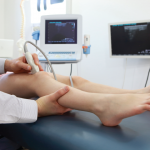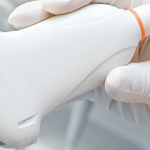“There are certain joints that are very hard to find using palpation,” says Dr. Kissin. “For example, most rheumatologists won’t inject hip joints. These are fairly easy to inject with guidance from ultrasound.”
There are a number of studies suggesting that increased blood flow to a joint as measured by ultrasound is predictive of future damage. In addition to diagnosis and treatment, US may also be useful in developing a prognosis.
The next question for most physicians would be: Why should I consider getting my own machine? Why not just send patients to a nearby imaging center?
ACR Responds to Members’ Questions About Ultrasound Use
- Should a rheumatologist use ultrasound?
- Does ultrasound improve patient outcomes?
- What is appropriate use; what is inappropriate use?
- How much training is needed to effectively perform and make a clinical diagnose using ultrasound?
- Should ultrasound certification be required?
- Should ultrasound training be incorporated into the fellowship curriculum?
- Is ultrasound only used to boost practice revenue?
- What does the research say about ultrasound?
- How many rheumatologists are using ultrasound?
- Is ultrasound reimbursement an issue?
With ultrasound’s growing presence in rheumatology, these are just a few of the questions the ACR leadership sought to answer when they invited members with varying ultrasound expertise to participate in a Task Force last August.
The Task Force surveyed the membership, commissioned a job task analysis study, evaluated the needs of training programs, explored partnership opportunities, studied other musculoskeletal certification models and educational courses, and investigated the feasibility of the ACR offering a certification program.
The preliminary Task Force report indicated the need for more educational opportunities and mentors. In response, the ACR expanded its ultrasound beginner courses, and plans are underway to offer an intermediate course with a cadaver workshop and a train-the-trainer program in 2012. The next ACR Musculoskeletal Ultrasound Course for Rheumatologists will be held as an annual meeting preconference course on November 4–5 in Chicago.
The Task Force’s final report, which will address certification, will be presented to the ACR board of directors in August. The findings of the report will also be published on the ACR’s website, www.rheumatology.org.
Coding changes and payment concerns related to ultrasound use are being closely monitored by the ACR’s coding staff. Practitioners that experience any issues with payment should contact Cindy Gutierrez, practice management specialist, at (404) 633-3777, ext. 310.
Advantages of an In-office Unit
“With office-based ultrasound we can get needed information instantly,” says Dr. Samuels. “You don’t have to inconvenience the patient, and yourself, by stopping the examination, sending them elsewhere, waiting for the results, and then having the patient come back a few days later.”



